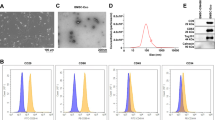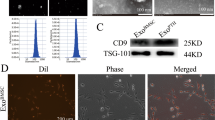Abstract
Osteoarthritis (OA) is the most common chronic joint disease worldwide. Chondrocyte, as the only resident cell type in cartilage, its apoptosis is of pathogenetic significance in OA. Mesenchymal stem cell (MSC)-based-therapy has been proved effective in OA in animals and clinical studies. Nowadays, the regenerative potential of MSC-based therapy is mostly attributed to its paracrine secretion, in which exosomes may play an important role. In the present study, we aimed to find out the significance of MSC-derived exosomes (MSC-Exos) on the viability of chondrocytes under normal and inflammatory conditions. Bone marrow MSCs (BMSCs) and chondrocytes from rabbits were cultured in vitro. BMSC-Exos were isolated by an ultracentrifugation method. Transmission electron microscopy and Western blot were used to identify exosomes. The internalization of BMSC-Exos into chondrocytes was observed by fluorescent microscope. The viability and apoptosis of chondrocytes induced by IL-1β were tested through MTT method, Hoechst33324 dying, and mitochondrial damage measurement. Phosphorylation of p38, ERK, and Akt were evaluated by Western blot. The results showed that BMSC-Exos were round-shaped. Co-culturing BMSC-Exos with chondrocytes could observe the uptake of BMSC-Exos by chondrocytes. The viability decreased, apoptosis occurred, and the mitochondrial membrane potential of chondrocytes changed a lot when IL-1β were given, but all the changes were almost abolished when BMSC-Exos was added. Furthermore, the phosphorylation of p38 and ERK were inhibited, and phosphorylation of Akt was promoted by BMSC-Exos compared with IL-1β group. The present study demonstrated that BMSC-Exos inhibited mitochondrial-induced apoptosis in response to IL-1β, and p38, ERK, and Akt pathways were involved. BMSC-Exo might represent a novel cell-free therapeutic approach for the treatment of OA.






Similar content being viewed by others
References
Azmi AS, Bao B, Sarkar FH (2013) Exosomes in cancer development, metastasis and drug resistance: a comprehensive review. Cancer Metastasis Rev 32:623–642
Baglio SR, Pegtel DM, Baldini N (2012) Mesenchymal stem cell secreted vesicles provide novel opportunities in (stem) cell-free therapy. Front Physiol 3:359
Blanco FJ, Rego I, Ruiz-Romero C (2011) The role of mitochondria in osteoarthritis. Nat Rev Rheumatol 7:161–169
Bornes TD, Adesida AB, Jomha NM (2014) Mesenchymal stem cells in the treatment of traumatic articular cartilage defects: a comprehensive review. Arthritis Res Ther 16:432
Brittberg M, Peterson L, Sjögren-Jansson E, Tallheden T, Lindahl A (2003) Articular cartilage engineering with autologous chondrocyte transplantation. A review of recent developments. J Bone Joint Surg Am 85-A:109–115
Burger D, Viñas JL, Akbari S, Dehak H, Knoll W, Gutsol A, Carter A, Touyz RM, Allan DS, Burns KD (2015) Human endothelial colony-forming cells protect against acute kidney injury: role of exosomes. Am J Pathol 185:2309–2323
Chang L, Karin M (2001) Mammalian MAP kinase signalling cascades. Nature 410:37–40
Chen TS, Lai RC, Lee MM, Choo AB, Lee CN, Lim SK (2010) Mesenchymal stem cell secretes microparticles enriched in premicroRNAs. Nucl Acids Res 38:215–224
Chen Z, Yue SX, Zhou G, Greenfield EM, Murakami S (2015) ERK1 and ERK2 regulate chondrocyte terminal differentiation during endochondral bone formation. J Bone Miner Res 30:765–774
Cosenza S, Ruiz M, Toupet K, Jorgensen C, Noël D (2017) Mesenchymal stem cells derived exosomes and microparticles protect cartilage and bone from degradation in osteoarthritis. Sci Rep 7:16214
Cross M, Smith E, Hoy D, Nolte S, Ackerman I, Fransen M, Bridgett L, Williams S, Guillemin F, Hill CL, Laslett LL, Jones G, Cicuttini F, Osborne R, Vos T, Buchbinder R, Woolf A, March L (2014) The global burden of hip and knee osteoarthritis: estimates from the global burden of disease 2010 study. Ann Rheum Dis 73:1323–1330
Ferguson SW, Wang J, Lee CJ, Liu M, Neelamegham S, Canty JM, Nguyen J (2018) The microRNA regulatory landscape of MSC-derived exosomes: a systems view. Sci Rep 8:1419
Fresno Vara JA, Casado E, de Castro J, Cejas P, Belda-Iniesta C, González-Barón M (2004) PI3K/Aktsignalling pathway and cancer. Cancer Treat Rev 30:193–204
Goldring MB, Marcu KB (2009) Cartilage homeostasis in health and rheumatic diseases. Arthritis Res Ther 11:224
Hu GW, Li Q, Niu X, Hu B, Liu J, Zhou SM, Guo SC, Lang HL, Zhang CQ, Wang Y, Deng ZF (2015) Exosomes secreted by human-induced pluripotent stem cell-derived mesenchymal stem cells attenuate limb ischemia by promoting angiogenesis in mice. Stem Cell Res Ther 6:10
Hwang HS, Kim HA (2015) Chondrocyte apoptosis in the pathogenesis of osteoarthritis. Int J Mol Sci 16:26035–26054
Im GI (2016) Regeneration of articular cartilage using adipose stem cells. J Biomed Mater Res A 104:1830–1844
Im GI (2017) Clinical use of stem cells in orthopaedics. Eur Cell Mater 33:183–196
Lai RC, Arslan F, Lee MM, Sze NS, Choo A, Chen TS, Salto-Tellez M, Timmers L, Lee CN, El Oakley RM, Pasterkamp G, de Kleijn DP, Lim SK (2010) Exosome secreted by MSCs reduces myocardial ischemia/reperfusion injury. Stem Cell Res 4:214–222
Lai RC, Tan SS, Teh BJ, Sze SK, Arslan F, de Kleijn DP, Choo A, Lim SK (2012) Proteolytic potential of the MSC exosome proteome: implications for an exosome-mediated delivery of therapeutic proteasome. Int J Proteom 2012:971907
Li H, Liu D, Li C, Zhou S, Tian D, Xiao D, Zhang H, Gao F, Huang J (2017a) Exosomes secreted from mutant-HIF-1α-modified bone-marrow-derived mesenchymal stem cells attenuate early steroid-induced avascular necrosis of femoral head in rabbit. Cell Biol Int 41:1379–1390
Li J, Tan M, Xiang Q, Zhou Z, Yan H (2017b) Thrombin-activated platelet-derived exosomes regulate endothelial cell expression of ICAM-1 via microRNA-223 during the thrombosis-inflammation response. Thromb Res 154:96–105
Li J, Yu J, Zhang H, Wang B, Guo H, Bai J, Wang J, Dong Y, Zhao Y, Wang Y (2016) Exosomes-derived MiR-302b suppresses lung cancer cell proliferation and migration via TGFβRII inhibition. Cell Physiol Biochem 38:1715–1726
Liang X, Ding Y, Zhang Y, Tse HF, Lian Q (2014) Paracrine mechanisms of mesenchymal stem cell-based therapy: current status and perspectives. Cell Transplant 23:1045–1059
Liu Y, Lin L, Zou R, Wen C, Wang Z, Lin F (2018a) MSC-derived exosomes promote proliferation and inhibit apoptosis of chondrocytes via lncRNA-KLF3-AS1/miR-206/GIT1 axis in osteoarthritis. Cell Cycle 17:2411–2422
Liu Y, Zou R, Wang Z, Wen C, Zhang F, Lin F (2018b) Exosomal KLF3-AS1 from hMSCs promoted cartilage repair and chondrocyte proliferation in osteoarthritis. Biochem J 475:3629–3638
Ma X, Wang J, Li J, Ma C, Chen S, Lei W, Yang Y, Liu S, Bihl J, Chen C (2018) Loading miR-210 in endothelial progenitor cells derived exosomes boosts their beneficial effects on hypoxia/reoxygeneation-injured human endothelial cells via protecting mitochondrial function. Cell Physiol Biochem 46:664–675
Maneiro E, Martín MA, de Andres MC, López-Armada MJ, Fernández-Sueiro JL, del Hoyo P, Galdo F, Arenas J, Blanco FJ (2003) Mitochondrial respiratory activity is altered in osteoarthritic human articular chondrocytes. Arthritis Rheum 48:700–708
Maniatopoulos C, Sodek J, Melcher AH (1988) Bone formation in vitro by stromal cells obtained from bone marrow of young adult rats. Cell Tissue Res 254:317–330
Marcacci M, Berruto M, Brocchetta D, Delcogliano A, Ghinelli D, Gobbi A, Kon E, Pederzini L, Rosa D, Sacchetti GL, Stefani G, Zanasi S (2005) Articular cartilage engineering with Hyalograft C: 3-year clinical results. Clin Orthop Relat Res 435:96–105
Martini M, De Santis MC, Braccini L, Gulluni F, Hirsch E (2014) PI3K/AKT signaling pathway and cancer: an updated review. Ann Med 46:372–383
Mayan MD, Gago-Fuentes R, Carpintero-Fernandez P, Fernandez-Puente P, Filgueira-Fernandez P, Goyanes N, Valiunas V, Brink PR, Goldberg GS, Blanco FJ (2015) Articular chondrocyte network mediated by gap junctions: role in metabolic cartilage homeostasis. Ann Rheum Dis 74:275–284
Ochi M, Adachi N, Nobuto H, Yanada S, Ito Y, Agung M (2004) Articular cartilage repair using tissue engineering technique novel approach with minimally invasive procedure. Artif Organs 28:28–32
Phornphutkul C, Wu KY, Auyeung V, Chen Q, Gruppuso PA (2008) mTOR signaling contributes to chondrocyte differentiation. Dev Dyn 237:702–712
Pittenger MF, Mackay AM, Beck SC, Jaiswal RK, Douglas R, Mosca JD, Moorman MA, Simonetti DW, Craig S, Marshak DR (1999) Multilineage potential of adult human mesenchymal stem cells. Science 284:143–147
Reza AM, Choi YJ, Yasuda H, Kim JH (2016) Human adipose mesenchymal stem cell-derived exosomal-miRNAs are critical factors for inducing anti-proliferation signalling to A2780 and SKOV-3 ovarian cancer cells. Sci Rep 6:38498
Roma-Rodrigues C, Fernandes AR, Baptista PV (2014) Exosome in tumour microenvironment: overview of the crosstalk between normal and cancer cells. Biomed Res Int 2014:179486
Shi B, Wang Y, Zhao R, Long X, Deng W, Wang Z (2018) Bone marrow mesenchymal stem cell-derived exosomal miR-21 protects C-kit+ cardiac stem cells from oxidative injury through the PTEN/PI3K/Aktaxis. PLoS One 13:e0191616
Sixt SU, Peters J (2010) Extracellular alveolar proteasome: possible role in lung injury and repair. Proc Am ThoracSoc 7:91–96
Sung DK, Chang YS, Kang S, Song HY, Park WS, Lee BH (2010) Comparative evaluation of hypoxic-ischemic brain injury by flow cytometric analysis of mitochondrial membrane potential with JC-1 in neonatal rats. J Neurosci Methods 193:232–238
Tao SC, Yuan T, Zhang YL, Yin WJ, Guo SC, Zhang CQ (2017) Exosomes derived from miR-140-5p-overexpressing human synovial mesenchymal stem cells enhance cartilage tissue regeneration and prevent osteoarthritis of the knee in a rat model. Theranostics 7:180–195
Tofiño-Vian M, Guillén MI, Pérez Del Caz MD, Silvestre A, Alcaraz MJ (2018) Microvesicles from human adipose tissue-derived mesenchymal stem cells as a new protective strategy in osteoarthritic chondrocytes. Cell Physiol Biochem 47:11–25
Tomasetti M, Lee W, Santarelli L, Neuzil J (2017) Exosome-derived microRNAs in cancer metabolism: possible implications in cancer diagnostics and therapy. Exp Mol Med 49:e285
Tomasetti M, Nocchi L, Staffolani S, Manzella N, Amati M, al GJ (2014) MicroRNA-126 suppresses mesothelioma malignancy by targeting IRS1 and interfering with the mitochondrial function. Antioxid Redox Signal 21:2109–2125
Vinatier C, Bouffi C, Merceron C, Gordeladze J, Brondello JM, Jorgensen C, Weiss P, Guicheux J, Noël D (2009) Cartilage tissue engineering: towards a biomaterial-assisted mesenchymal stem cell therapy. Curr Stem Cell Res Ther 4:318–329
Wang Y, Yu D, Liu Z, Zhou F, Dai J, Wu B, Zhou J, Heng BC, Zou XH, Ouyang H, Liu H (2017) Exosomes from embryonic mesenchymal stem cells alleviate osteoarthritis through balancing synthesis and degradation of cartilage extracellular matrix. Stem Cell Res Ther 8:189
Wei Y, Bai L (2016) Recent advances in the understanding of molecular mechanisms of cartilage degeneration, synovitis and subchondral bone changes in osteoarthritis. Connect Tissue Res 57:245–261
Wood DD, Ihrie EJ, Dinarello CA, Cohen PL (1983) Isolation of an interleukin-1-like factor from human joint effusions. Arthritis Rheum 26:975–983
Xin H, Li Y, Chopp M (2014) Exosomes/miRNAs as mediating cell-based therapy of stroke. Front Cell Neurosci 8:377
Zhu Y, Wang Y, Zhao B, Niu X, Hu B, Li Q, Zhang J, Ding J, Chen Y, Wang Y (2017) Comparison of exosomes secreted by induced pluripotent stem cell-derived mesenchymal stem cells and synovial membrane-derived mesenchymal stem cells for the treatment of osteoarthritis. Stem Cell Res Ther 8:64
Author information
Authors and Affiliations
Corresponding author
Rights and permissions
About this article
Cite this article
Qi, H., Liu, DP., Xiao, DW. et al. Exosomes derived from mesenchymal stem cells inhibit mitochondrial dysfunction-induced apoptosis of chondrocytes via p38, ERK, and Akt pathways. In Vitro Cell.Dev.Biol.-Animal 55, 203–210 (2019). https://doi.org/10.1007/s11626-019-00330-x
Received:
Accepted:
Published:
Issue Date:
DOI: https://doi.org/10.1007/s11626-019-00330-x




